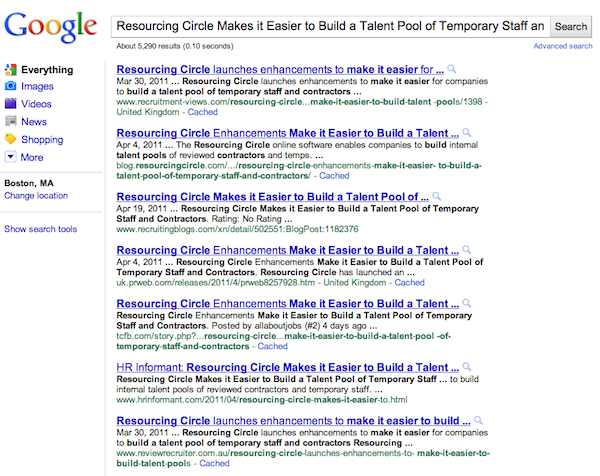Google Panda Update – Implications for Job Boards, Community Sites, and Publishers

The 2 metrics now considered to be the most important in the new algorithm are 1) uniqueness of the content, and 2) user engagement with the content. In fact, user engagement is now rumored to carry the highest weight of all signals (more than inbound links).
What does it mean?
The impact has been very severe on scraper sites, and those that take standard feeds from others to create duplicated content. Mashups sites, which combine non-unique elements on a page, or create “snippets” have also taken a hit. Google’s message is quite clear: sites that do not focus on original content and user experience will now be relegated to oblivion in their search index.
I actually welcome this change – it’s a nice step forward, and it encourages sites to do the right things. Google has always advised sites to focus on creating unique value for their users/customers. However, most sites create the bulk of their content primarily with SEO in mind – tailoring their content around well-searched keywords and such. This is all about to change. It’ll now be all about original content and user participation.
Content Farms and Sites with Duplicated Content
On April 12, Google completed Panda’s first significant rollout across the US and the UK. The effect was dramatic for some household names – some losing as much as 80% of their search visibility overnight.
| ezinearticles.com | -78% |
| shopzilla.co.uk | -77% |
| hubpages.com | -72% |
| ciao.co.uk (owned by Microsoft) | -81% |
| associatedcontent.com (owned by Yahoo) | -82% |
| shopping.com | -74% |
| bizrate.co.uk | -76% |
| mahalo.com | -77% |
| findarticles.com | -82% |
| articlesbase.com | -79% |
| answerbag.com | -78% |
| encyclopedia.com | -77% |
* Source: Sistrix.com
A much talked about story last week was how Demand Media’s Ehow.com – the poster child for content farms – was spared the ax. In fact, Sistrix even reported that Ehow actually gained traffic from the Panda update, leaving many experts scratching their heads! Demand Media CEO, Richard Rosenblatt, even went on record praising Google for being a great partner, and how his company filled gaps in Google’s index, supplied more than 2 billion views on YouTube and was a large Adsense player.
But a couple of days ago, Ehow got hit big time – with a 60% drop in search visibility. This suggests that Panda’s roll out is happening in rounds – Ehow was just lucky to escape the first one. In the latest algorithm update, Google seems to be focusing on long tail keywords and has started to factor in user data for blocked sites (i.e., sites that users are flagging/blocking in their search results, via a feedback link).
The Panda update originally covered 12% of all search terms, and has since moved to 14%. Given what happened to Ehow, I predict that the algorithm will roll out across all search keywords in successive waves over the coming months. What we’re seeing here is the making of a completely new Google – SEO as we know it, may be over.
One thing is clear: Google has revamped its ability to flag duplicate content. Community sites that post the same regurgitated stories found on dozens of other sites – despite having original user-generated discussions around them – are getting downgraded, with an average ranking drop of over 30 spots across targeted keywords. In fact, even sites with a mix of original and duplicated content are finding themselves penalized – not just the duplicated pages, but the entire site domain itself.
Who is the Original Publisher?

The search engine results page above is precisely what Google is going after. So whose site will get penalized above? Google obviously knows who the original publisher of that article is, right? Well, unfortunately, it’s not that simple. There have been reports of higher authority sites ranking above the original site for a particular page – and the latter actually getting penalized and demoted in the process!
Consequences for Job Boards and Publishers in the Recruiting Space
So far we’ve seen a massive loss of search engine visibility for content farms, especially article repositories. Tech blogs (those that spin the same stories) have also been hit hard. Sites that relied heavily on Google for their traffic now find themselves in dire straits. Almost nobody has recovered and it has been over a month since the algorithm went live (and we’re talking about sites with millions of unique visitors per month).
Some real estate sites have also started seeing an impact – most syndicate the same MLS listings found elsewhere, creating massive duplication of content. Who gets demoted and who gets promoted is still anyone’s guess at this point.
The next Panda rollout will likely take down a lot of e-commerce sites. After-all, most shopping sites tend to use the same canned product titles and descriptions from the manufacturers. For sites with thousands or tens of thousands of products, the prospect of having to rewrite each product description into an original version could prove to be too daunting of a task.
So where does this leave recruiting community sites and other HR/recruitment “resource sites” that have a very high percentage of syndicated (re: duplicated) user-generated content? Personally, I don’t think it’s going to be a fun 2011 for most. I expect them to see up to a 60% drop in their traffic by the end of the year.
But what about job boards ? Aren’t postings in the employment market just like MLS listings or products, with the same job description being posted over and over again across many job boards? If real estate, travel and e-commerce sites are being impacted by the Panda rollout, then why would job sites be spared? I don’t think they will. Google is treating anything duplicated as “low value”. And even if sites mix original content with duplicated ones, they’re still being axed. Google is saying that sites hit by the Panda update are likely to be hit on all pages on the site, even if some pages are good quality. Sure, one can always rewrite a product description on an e-commerce site – but how do you rewrite a job description? Only Google knows what will happen to Job Boards right now.
Solution for Recruitment-Related “Resource” Sites
There are some very obvious ones:
- Remove all duplicated content from your site, and don’t accept any user content unless it is original.
- Use your Analytics data and find any page with high bounce rates – remove those from your site.
- For every duplicated page that has a low bounce rate (re: high engagement), consider rewriting it so it’s original.
- Think user engagement. Reduce your ads-to-content ratio – focus more on the user experience instead of monetization of your content.
- Do NOT syndicate your content elsewhere without mandating a “nofollow” from the downstream publisher!
- Go after anyone who is syndicating your content without your express permission. Ask nicely first, then hit them with a DMCA notice if they don’t comply.
Like I mentioned before, I expect the Panda rollout to affect all search terms by the end of 2011. So if your site hasn’t been affected yet, don’t think you’ve been spared. It’s time to start fixing things before this algorithm finds you.
Panda is nothing more than Google’s impetus to remain competitive in the search engine space. It has been losing ground to Bing in the past few months, and there have been numerous public reports about the quality degradation of Google’s search results. I think that, more than ever, Google is now using user generated signals to rank the relevancy of their search results. Sites with a high percentage of duplicated content should rightly be penalized – especially if the users say so (re: bounce rates, time on site, etc.). If your site’s average bounce rate is above 65%, then you should be worried.
While I welcome this update, I don’t think it’s without faults. For one, smaller sites are being unfairly penalized, even though they are the original publishers of the subsequently syndicated content. Perhaps Google will tweak this during the coming months (I suspect they will). There’s also something to be said about being a “hub” within your industry – even though such sites are mostly a “mashup” of duplicated content, they do provide value to their users/members. Job boards fall into this category. It’s a much better user experience for a job seeker to find all job listings on one consolidated site, rather than searching for them on dozens of disparate sites.
It ultimately all depends on what Google thinks of “user experience”. I, for one, am curious to see how Panda impacts Indeed, if at all – given Indeed’s site authority.

